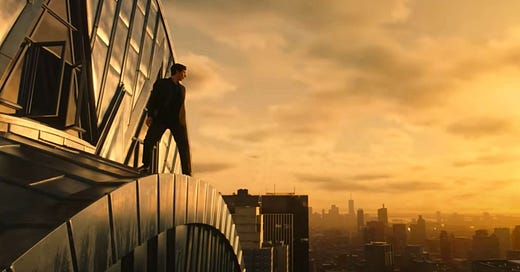Master builder Cesar (Adam Driver) beholds New Rome, the city he’s bent on transforming
Megalopolis (2024)
In theaters
This is the much talked about extravaganza financed in large part with roughly $140 million by Francis Ford Coppola (he had some help from others). The esteemed director has poured that vast sum into this gargantuan tale of overweening pride to urge us all to be humbler. As nearly as I could tell.
He’s fretted over and re-written the script for 40 years, and the result is a sprawling morality tale that screams: Urgent! Emergency!
Coppola is 84, and in the massive, doom-laden style he’s adopted here, he seems to be thrusting the picture at us, pulling every trick he can conjure to force us to look: See, see here, what a festering sore our planet has become.
It feels like a raging summing up, with an oddly elegiac undertone. Is he summoning a hoped-for new world, or warning of approaching collapse for the one around us?
Some of both, it seems. His “fable”, as he labels it at the opening in Roman type etched on classic marble, is set slightly in the future in a city called New Rome, intricately patterned after New York City.
I’m generally wary whenever a contemporary artist calls his work “a fable”. I wonder if he’s trying to persuade us that his effort is “one for the ages” in order to camouflage a shaky “vision”.
Alas, that’s what’s going on here. Coppola’s protagonist, Cesar Catalina (Adam Driver), is an idealistic architect who heads New Rome’s powerful Design Authority (think Robert Moses, the urban master planner who held multiple offices while ruthlessly reshaping New York City from the 1920s to the 1970s).
He’s opposed by Mayor Franklyn Cicero (Giancarlo Esposito), a pragmatic politician who denounces Cesar’s high-flown proposals for the future of the city as a megalomaniac’s pipedream.
The Mayor wants to meet the needs of the people. Cesar insists that he does too, and to do it he’s dreamed up a vision for a city of the future he calls Megalopolis. To bring his utopia into reality, he harbors a near magical substance, Megalon, which can be a plastic, a metal, a liquid for injection, or take still other benign forms.
This miraculous element can replace bodily organs, hold aloft mushroom-shaped skyscrapers, power gliding sidewalks and heal potentially fatal wounds.
The problem for us in the audience is, we never learn how Cesar hit upon or invented it. We’re told he won a Nobel Prize, but in what field? Chemistry? Physics? Medicine? That’s never revealed.
Nothing here struck me as visually ravishing. Why? Because the “beautiful” set design, costumes and cinematography are merely, expensively, ornamental. They’re not expressive.
What do these shimmering, sometimes violent, images correspond to in our world, the one where Coppola has to reach us? From scene to scene, I couldn’t get any clear focus on which forces were pitted against one another, or why.
Oh, don’t be so literal, the movie preposterously seems to suggest. He’s a “genius”, we’re meant to conclude, and a bumbling, corrupt society would be smart to get out of this driven theorist’s way.
When, out of nowhere, Cesar starts to recite Hamlet’s To be or not to be soliloquy, my jaw dropped. Was Coppola appropriating Shakespeare to lend his “hero” tragic nobility? Oh, yes.
Also, sprinkled throughout the script are quotes from Emerson and Marcus Aurelius, to point up Cesar’s unbending self-reliance and stoical fortitude.
This was staunch “principle” borrowed but not earned by anything we see Cesar devise or accomplish. We have to take on faith CGI-created “renderings” of his proposed future.
But the mere dazzling sight of them is supposed to keep us rooting for Cesar while the script tosses in his greedy banker uncle, Crassus (Jon Voight), and his envious, rabble-rousing cousin, Clodio (Shia LaBeouf).
He’s also stalked by Wow Platinum (Aubrey Plaza), a business journalist hot for Cesar’s body who also covets Crassus’s millions. She’ll do anything for the flesh and the cash.
To be sure, Cesar has allies. Julia Cicero (Nathalie Emmanuel), Mayor Cicero’s daughter, falls in love with the renegade architect while Fundi (Laurence Fishburne), Cesar’s driver and the story’s narrator, remains steadfast (a sort of Alfred the Butler to reclusive Bruce Wayne – the allusions are hazy).
The city’s wealthy elite leap into hedonistic abandon, including a resplendent Vestal Virgin competition that treats women like bathing-suited baubles (a Miss Universe pageant would never allow such rank exploitation).
Pretty much all women do in this “vision” is snort cocaine, pose like sex toys, lust after Cesar, like Wow Platinum, or cuddle up to him and, unable to resist, sleep with him, like Julia.
Women in Coppola’s imagining mostly writhe in lust and wallow in crass materialism. Or they have babies for men, as Julia does for Cesar, making him feel “complete”, a real man, a happy warrior for social justice.
Crowds yelling “Power to the people” hint that Coppola is on the side of the masses, though they’re never given a charismatic leader who might let us believe that the director understands actual want in the real world.
Esposito gives the movie’s best performance as the Mayor, with grave, passionate line readings that suggest a moral seriousness the script unfortunately doesn’t support.
And Nathalie Emmanuel is lovely and sometimes close to moving as the deeply smitten Julia. Driver, to be charitable, stays adrift in the director’s fervent projection of virtue onto the tormented Cesar.
Indeed, even with two honorable performances, all these characterizations are not only shockingly adolescent, but they’re also curiously outdated and fantastical. This is eighth-grade-boy imagining, and I found it unrelievedly ugly to behold and morally distressing.
Reality and fantasy blend as Cesar envisions a utopian future with his beloved Julia
Nothing here struck me as visually ravishing. Why? Because the “beautiful” set design, costumes and cinematography are merely, expensively, ornamental. They’re not expressive.
What do these shimmering, sometimes violent, images correspond to in our world, the one where Coppola has to reach us? From scene to scene, I couldn’t get any clear focus on which forces were pitted against one another, or why.
Like Coppola, I can quote canonical artists and thinkers, and I thought of Matthew Arnold’s 1867 poem “Dover Beach”, which famously ends: [W]e are here on a darkling plain/ Swept with confused alarms of struggle and flight,/ Where ignorant armies clash by night.
At least Arnold, as despairing about 19th century irresolution as Coppola is about 21st century rancor, was honest. He didn’t have answers, even as he fully understood how desperately Victorian society was searching for them.
This kind of artistic integrity seems to be utterly beyond Coppola. His movie isn’t actually centered on an idealistic architect’s struggle to bring the truth to light.
It’s an aged moviemaker’s self-pitying aggrandizement about his own less than superlative career as it has declined. In cornered self-defense, he throws the kitchen sink of “discord” at us with filmmaking gimcrackery.
But nobody ever demanded that his earlier work be perfect. We were amazed when masterpieces like The Godfather I and II pierced through sordid realities to touch on, astoundingly, a common humanity.
Such a goal is now far beyond Coppola’s reach, and what’s surprising about that? It might be true for any major artist at age 84. Indeed, the contrary can hold, as fate may shortly dictate, when director Clint Eastwood’s new movie, Juror #2, arrives next month. Eastwood is 94.
The fault, to drag in dear old Shakespeare again, is not in our stars but in ourselves. Megalopolis leaves the overwhelming impression that Coppola with this frantic late life leap isn’t actually reaching for cinematic excellence.
He’s mourning what hasn’t happened in his late career, licking his wounds, and covering the bleeding with rhinestones. If our modern world is indeed cratering, sadly, it’s Coppola’s aching vanity – not his signal talent – that’s preceding it into the abyss.






Great piece, enjoyed how you contextualised Megalopolis within Coppola's canon. Actually comically appalling as a film but also, sad that his last effort feels very Benjamin Button-ish i.e. espousing overly simplistic viewpoints like that of an adolescent or even child.